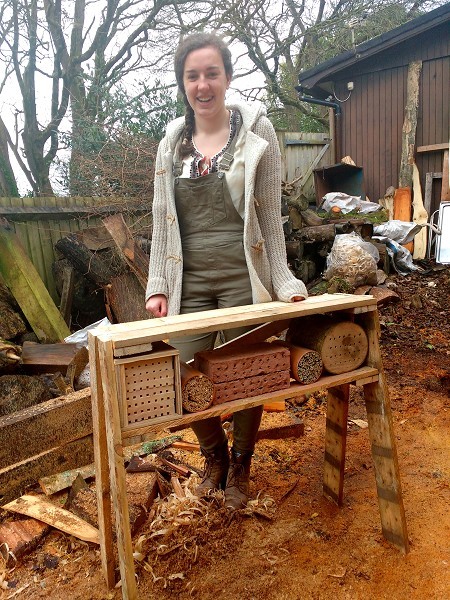Paignton Zoo is opening a chain of hotels – for bees… A student studying artificial nest-sites for bees has put up ten “bee hotels” in the Zoo’s 80 acres of grounds.
Emily Tyack, a third year Environmental Biology student at the University of Nottingham, is on a year-long placement with the Field Conservation & Research Department of the Whitley Wildlife Conservation Trust, the charity that runs Paignton Zoo, Living Coasts in Torquay and Newquay Zoo in Cornwall.
The bees that Emily is researching are not the sort that help put honey on our breakfast tables: “Most people are familiar with the honey bee. There are also 25 species of bumble bee that buzz around our gardens on a sunny day. But there are also about 250 species of solitary bee in the UK.

“My research project is assessing the effectiveness of artificial nest sites for solitary bees in areas that otherwise provide suitable resources, such as flower beds for nectar and pollen. Bees are threatened by habit loss and increased agricultural practices – it’s hoped that by providing artificial nesting sites, we will create more viable areas in which British bee species can nest and support a population.
“Honey and bumble bees live in colonies, but solitary bees choose to nest in individual holes. These are the bees I am hoping to learn more about.” Emily has spent the winter period - whilst bees are hibernating - making different types of bee house. These have been boxed up together to create ten grand bee hotels.
“Different species have different nesting preferences. You might have solitary bees in the brickwork of your house or the canes supporting your runner beans. The red mason bee is cavity nesting - it lays an egg at the end of a long hollow, provides the egg with pollen and nectar and then seals it up using mud. The leafcutter bee does the same thing but uses leaf matter to seal the hole. Carpenter bees nest in wood, mining bees prefer to bore holes in sandy soils and nest there.”
Every hotel has one of each of the types of bee house; there’s a drilled log, a reed tube, a cob brick, a bamboo tube and a wooden slot box. The aim is to provide a variety of nesting media with a range of diameter holes so that Emily can find out which species prefers which medium and which sized hole.
The bee hotels have been placed in sunny spots around Paignton Zoo, including outside the Zoo’s Vet Centre, near the train station, in the wildlife garden and on the big lawn not far from Crocodile Swamp. The Whitley Wildlife Conservation Trust hosts around 100 students every year at its three zoos, including those on year-long placements like Emily, MSc students from universities in Plymouth and Exeter and other visiting researchers.
A vast collection of animals await visitors at Paignton Zoo including the rare Cuban crocodile, black rhino, sumatran tiger and giant tortoise.
View attractionA vast collection of animals await visitors at Paignton Zoo including the rare Cuban crocodile, black rhino, sumatran tiger and giant tortoise.
View attraction